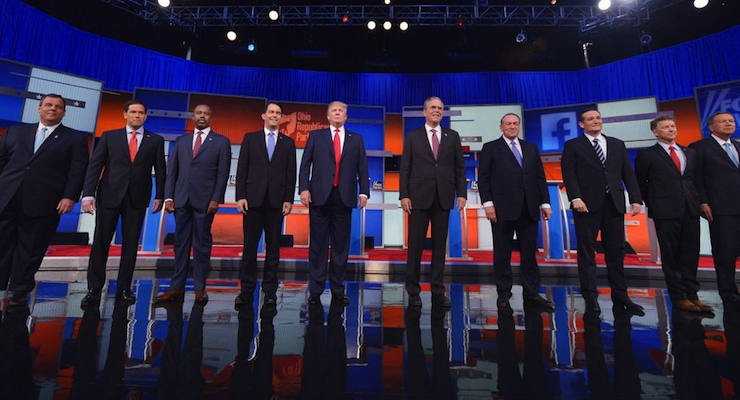

Republican presidential candidates arrive on stage for the Republican presidential debate on August 6, 2015 at the Quicken Loans Arena in Cleveland, Ohio. From left are: New Jersey Gov. Chris Christie; Florida Sen. Marco Rubio; retired neurosurgeon Ben Carson; Wisconsin Gov. Scott Walker; real estate magnate Donald Trump; former Florida Gov. Jeb Bush; former Arkansas Gov. Mike Huckabee; Texas Sen. Ted Cruz; Kentucky Sen. Rand Paul; and Ohio Gov. John Kasich. AFP PHOTO / MANDEL NGAN (Photo credit should read MANDEL NGAN/AFP/Getty Images)
Back in March, I asked why Republican presidential candidates were willing to openly violate federal anti-bribery law by supporting agriculture subsidies in exchange for campaign loot. My question was merely rhetorical, of course, since politician supposedly aren’t violating the law because the money goes to their campaigns rather than their personal bank accounts.
But that doesn’t change the fact that there’s a sleazy quid pro quo. If you think I’m exaggerating, you’ll change your mind after reading these excerpts from a column by the superb muckraking journalist Tim Carney. The target of his piece in the Washington Examiner is Congressman Stephen Fincher of Tennessee.
Congressman Stephen Fincher…, once an opponent of the Export-Import Bank —a federal agency that subsidizes foreign buyers of U.S.-made goods — now is trying to undermine his party’s leadership by teaming up with Nancy Pelosi and her party in order to reauthorize Ex-Im Bank as President Obama and his big donors in the business lobby have demanded. …Fincher has pulled up his Tennessee roots and is now firmly planted in D.C. Instead of serving Western Tennessee, Fincher..now represents Wall Street and K Street.
Is this hyperbole? Well, check out what Tim found out about his fundraising.
Fincher has raised a quarter-million for his re-election, according to his most recent campaign finance filing. Exactly two of his approximately 150 donations have come from Tennessee residents. Tennessee residents have given Fincher a combined $750, which rounds to 0 percent of his money raised.
And why are out-of-state donors lining up to give Fincher money? Draw your own conclusions.
Fincher introduced his bill to reauthorize Ex-Im on Jan. 28. Two days later his campaign deposited a $2,000 check from General Electric, Ex-Im’s second-largest beneficiary and most ruthless defender. …Boeing (which benefits from 40 percent of Ex-Im subsidies) and United Technologies chipped in about a week and a half later. All of Ex-Im’s top beneficiaries, exporters and lenders (notably Ex-Im’s leading lender JPMorgan), have given to Fincher’s re-election.
The corrupt Ex-Im Bank is just one example of the for-sale sign in Fincher’s office. Odious agriculture subsidies also can be purchased, even though none of the loot winds up in the pockets of Tennesseans.
Fincher has voted to protect the federal sugar program, whereby our government keeps out foreign sugar and issues taxpayer-backed loans to guarantee high prices for U.S. sugar growers. This hurts families, U.S.-based foodmakers and the economy, while benefitting a handful of privileged sugar companies. Tennessee produces no sugarcane or sugar beets… But Fincher’s donors do. Sugar Cane Growers of Florida PAC, American Crystal Sugar PAC, American Sugar Cane League PAC, Florida Sugar Cane League PAC, Southern Minnesota Beet Sugar Co-Op PAC and the U.S. Beet Sugar PAC are all Fincher donors and all beneficiaries of the corporate welfare Fincher supports.
By the way, I should hasten to add that this doesn’t mean that Fincher is especially corrupt by congressional standards. Or that he’s completely bad. I’ve made the point before that most politicians are a combination of good and bad characteristics. It’s like they have a devil on one shoulder whispering bad advice and an angel on the other shoulder trying to get them to do the right thing.
And when the devil has a lot of PAC checks and the angel is a wonky think tank economist like yours truly, the bad guys oftentimes triumph. But not always. Fincher, for instance, has voted for budgets based on genuine entitlement reform. And in the grand scheme of things, reining in those programs is much more important to the nation’s long-run fiscal health than curtailing sleazy corporate welfare.
 That’s still no excuse, though, for Fincher’s behavior. He’s using the coercive power of government to steal from one group of people in order to provide unearned and undeserved goodies for another group. Democrats do the same thing, of course, and they’re quite promiscuous. They seemingly favor all forms of redistribution, ranging from traditional welfare to corporate welfare.
That’s still no excuse, though, for Fincher’s behavior. He’s using the coercive power of government to steal from one group of people in order to provide unearned and undeserved goodies for another group. Democrats do the same thing, of course, and they’re quite promiscuous. They seemingly favor all forms of redistribution, ranging from traditional welfare to corporate welfare.
But you can make a strong argument that Republicans are being even more immoral since they generally redistribute from the poor and middle class to the rich.
P.S. Since I’m not feeling particularly charitable to the political class, let’s close with some biting humor against the crowd in Washington. Regular readers know I’m not a big fan of Pope Francis, and I’ve shared some criticism based on the insights of Walter Williams and Thomas Sowell. But I definitely think this clever image is worth sharing.

P.P.S. If you like mocking the political class, I have lots of other material for you to enjoy. You can read about how the men and women in DC spend their time screwing us and wasting our money. We also have some examples of what people in Montana, Louisiana, Nevada, and Wyoming think about big-spending politicians. This little girl has a succinct message for our political masters, here are a couple of good images capturing the relationship between politicians and taxpayers, and here is a somewhat off-color Little Johnny joke. Speaking of risqué humor, here’s a portrayal of a politician and lobbyist interacting.
Returning to G-rated material, you can read about the blind rabbit who finds a politician. And everyone enjoys political satire, as can be found in these excerpts from the always popular Dave Barry. Let’s not forgot to include this joke by doctors about the crowd in Washington. And last but not least, here’s the motivational motto of the average politician.
P.P.P.S. One serious point. If we want to clean up corruption in Washington, more campaign finance laws won’t work. The only way to reduce corruption is to shrink the size of government.






